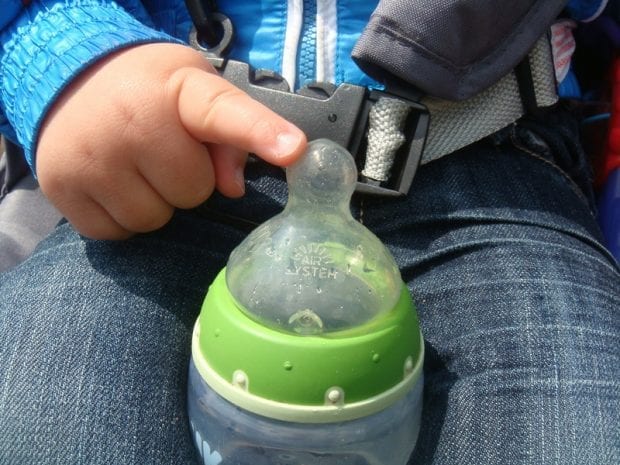Being a breastfeeding mother affects your relationship with your job and with your co-workers. Your colleagues may wonder about your frequent breaks, your pump, the milk stored in the refrigerator, or the way you leave work promptly to spend time with your baby. Some mothers may feel uncomfortable if co-workers make comments, or you may […]
- Home
- Topics (Page 60)
Legal Rights for Breastfeeding at Work?

In many countries of the world, there are laws that compel employers to allow nursing breaks or pumping breaks. Many of these countries also have liberal parental leave policies, so pumping or breastfeeding at work is actually not a common practice. U.S. courts have identified breastfeeding as a privacy issue, a right that is protected […]
Giving Formula Instead of Pumping

Breastfeeding is not an all-or-nothing deal. While many mothers who combine nursing and working do supply all of their baby’s milk feedings for many months, others use formula as a back-up when they are unable to pump enough milk. In other cases, baby nurses at the breast when mother is available and gets formula when […]
Getting Enough Milk? How to Tell

I’m worried my baby isn’t getting enough milk. How can I know for sure? Rather than worrying and wondering about whether your breastfed baby is getting enough milk, check the following signs: NUMBER OF WET DIAPERS • A baby who is getting enough milk will have 4 to 6 wet diapers a day by the […]
Feeding Frequently

Our three-week-old baby suddenly wants to nurse all the time. Does that mean I don’t have enough milk? Yes, but don’t worry–your body will soon make more. More-frequent requests to nurse usually mean that your baby is going through a growth spurt. These occur around ten days to three weeks, six weeks, and three months […]
Increasing Milk Supply

Increasing Milk Supply with Help From Baby Remember the three B’s of breastfeeding: the breast, the baby, and the brain. For increasing milk supply, the breast needs more stimulation from the baby and making that happen will require some adjustments in your brain. To increase your milk supply, you have to make breastfeeding a priority. […]
Hand Expressing Your Milk

The Low-Tech Approach: Hand Expression Expressing milk by hand works very well for some women. It’s a handy skill to have when: • You are caught somewhere with full breasts and you don’t have your baby or a breastpump, you’ll be able to relieve breast fullness and avoid problems with engorgement. • You do not […]
Does Baby Need Extra Water

Breastfeeding babies do not need extra water, though formula-fed babies often do. Your breastmilk contains enough water for your baby, even in hot, dry climates. Formula contains higher concentrations of salts and minerals than breastmilk does, so that extra water is often necessary for the kidneys to excrete the extra salt. Also, because of less […]
Giving Pacifiers

My baby nurses so often that my nipples are getting sore. Is it okay to give her a pacifier? Babies are born with an intense need to suck. Some infants even suck their thumbs in the womb. Babies not only suck for food, but they also love to suck for comfort. Pacifiers are just what […]
Clipping Tongue Ties and Lip Ties

Can Tongue Ties and Lip Ties Interfere with Nursing? Q: My mother thinks that our newborn has tongue-tie. Could this interfere with nursing? Tongue Ties A: Tongue-tie means that the membrane (the frenulum) that attaches the tongue to the floor of the mouth is shorter than usual. Some babies with tongue-tie breastfeed perfectly well; others […]
Extra Vitamins

Does my breastfeeding newborn need vitamin supplements? Unless your baby has special nutritional needs (for example, a tiny premie), you don’t need to give vitamin supplements. When fed by a healthy mother, a healthy, full-term baby who is getting enough breastmilk does not need vitamin or iron supplements. In the past, there has been concern […]
Weaning

WEANING: WHAT DOES IT MEAN? Weaning is not a negative term, nor is it something that you do to a child. Weaning is a journey from one relationship to another. The Hebrew word for wean is gamal, meaning “to ripen.” In ancient times, when children were breastfed until two or three years of age, it […]

